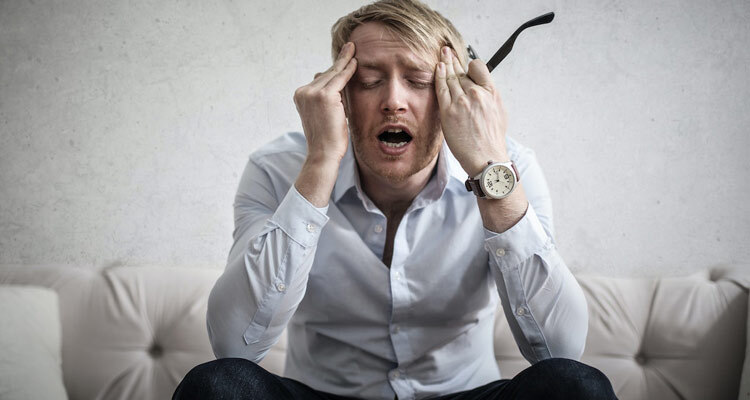
Clinical anxiety can wreak havoc on a person's life. Treatment for anxiety can be a challenge. Learn about a new approach in treating anxiety disorder that offers long-term results.
The future holds promise for a better way to treat anxiety.
"I have anxiety" seems to be a common phrase today. I see it on social media, hear it in general conversation, and people talk about anxiety as if it's a popular thing to have. Anxiety is not a trend, it's a serious medical condition that can wreak havoc on a person's quality of life.
I bring this up because as a mother and a registered nurse, I hear young adults often use the term 'anxiety lightly. For those who truly suffer from anxiety and panic attacks, it's not a condition to take lightly. Fortunately, psychiatrists now have a new approach to treating anxiety with possible FDA approval in 2022.
Experiencing anxiousness, nervousness or fear
Of course, feelings of anxiousness or nervousness occur at various times of everyone's life. It's normal to experience feelings of fear or worry when moving away from home to attend college, speaking to a large group of people, performing in front of an audience, financial struggles, or trying out for a sports team.
Clinical anxiety or generalized anxiety disorder (GAD)
Clinical anxiety or generalized anxiety disorder (GAD) is much more than an isolated event the precipitates temporary feelings of anxiousness or worry. GAD produces excessive worry and feelings of uncontrolled anxiousness, accompanied by feelings of fear about everyday situations. These symptoms can become so severe that a person may experience a panic attack. Sadly, panic attacks can mimic symptoms of a heart attack and can even produce chest pain and shortness of breath.
Anxiety and Depression Association of America
According to the Anxiety and Depression Association of America, GAD is diagnosis in adults when they experience at least three of the below symptoms on more days than not for at least six months; only one symptom in children:
- Restlessness or feeling keyed up or on edge
- Easily experience fatigue
- Difficulty concentrating or mind going blank
- Irritability
- Muscle tension
- Sleep disturbance (difficulty falling or staying asleep, or restless, unsatisfying sleep)
Anxiety presents in a variety of different forms
The most common is generalized anxiety disorder (GAD). GAD often leads to other mental health illnesses, such as depression. On the other hand, depression can lead to worsening anxiety. Both can lead to very poor quality of life. Moreover, certain medical conditions can also lead to GAD, such as chronic lung disease, hyperthyroidism, or asthma. Sadly, GAD can also lead to suicidal thinking or substance abuse.
Unfortunately, the medications most effective in treating anxiety can be habit-forming, leading to addiction. The cause of anxiety disorders is not fully understood. Furthermore, many agree that anxiety may be related to a history of traumatic life events or hereditary factors.
A New Approach to Treating Anxiety
Traditional anxiety treatment has primarily focused on medications combined with psychotherapy. However, these treatment approaches have proven ineffective for many patients. Although not yet FDA-approved for the treatment of anxiety, many psychiatrists are now using transcranial magnetic stimulation (TMS) as an effective treatment approach. With FDA approval, TMS is currently for the treatment of major depressive disorder and obsessive-compulsive disorder (OCD). OCD is a type of anxiety disorder. TMS has proven to be quite effective in treating severe anxiety. There is hope for FDA approval in the near future.
TMS is a non-invasive, outpatient treatment that was initially FDA approved in 2008 for the treatment of depression. It is now considered one of the most effective treatment options for depression and OCD. Unlike medications, there is no risk of abuse or systemic side effects. Moreover, patients benefit from the long-term relief that TMS can provide.
How TMS works to treat the anxiety-riddled brain?
We all know the riddle, "Which came first, the chicken or the egg?" This riddle is true for depression and anxiety. It's often difficult to discern which came first. The two conditions often go hand-in-hand, and this interconnectedness results from a dysregulation of the same neurocircuitry in the brain. Many patients who receive TMS for the treatment of depression also benefit from anxiety relief. Mood disorders are believed to be triggered by a disruption in the balance of neurochemical activity in the area of the brain that regulates mood.
A typical TMS therapy treatment involves a series of repeated, inhibitory, lower-frequency pulses that precisely treat a specific area of the brain known to regulate mood. These pulses actually create a current that affects the action of neurons in those specific areas. The short pulses of a magnetic field suppress the overactive area of the brain, reducing symptoms of anxiety. Essentially, TMS works to calm the anxiety riddled-brain.
If you are seeking TMS therapy as a treatment option for you or a loved one, TMS Directory can help you find a TMS clinic near you.





